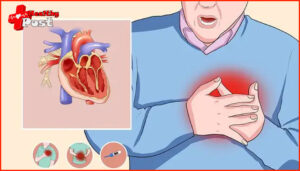
Normal and lower heart beat means longer life! Learn 3 ways to control your heart beat
In the words of doctors, when a person has a heartbeat for another person, the emotional center of the brain is activated first. These emotional signals will pass through the nerve conduction pathway and stimulate the sympathetic nervous system . After the sympathetic nerves are excited, they will release neurotransmitters such as norepinephrine .
Norepinephrine acts on the beta receptors of the heart, increasing the automaticity of the heart’s sinoatrial node , which leads to a faster heart rate. This is why you feel your heartbeat speed up during a heartbeat. Generally speaking, a normal resting heart beat may be 60-100 beats/minute, and during a heartbeat, the heart rate may rise to more than 100 beats/minute.
In fact, heart rate is not only the basis for judging whether the heart is beating or not, but also an important indicator to measure our health.

What is resting heart beat?
Resting heart beat, in simple terms, is the number of times the heart beats per minute in a quiet state, usually measured in beats per minute (BPM). It is like a mirror that can clearly reflect the working conditions of the heart and circulatory system. Generally speaking, the normal resting heart rate range for adults is 60 to 100 beats per minute.
Some people may say, hey, my heart rate is 70 and his heart rate is 92, both are within the normal range, so are we equally healthy?
The answer is no!
Research teams from France, the United Kingdom, and the United States conducted long-term follow-up surveys on their own populations. The results showed that there was an obvious inverse relationship between resting heart rate and life expectancy, that is, the lower the resting heart rate, the longer the life expectancy. Moreover, for every 10 beats/minute increase in resting heart rate within 5 years, the mortality risk ratio was 1.20, which means that the risk of death increased by 20% compared to the baseline.A study published in the Chinese Journal of Preventive Medicine also showed that the risk of all-cause death in the elderly increased with the increase in resting heart rate, and was relatively significant in the elderly aged 80-89.
From the above research, we can see that although they are all within the normal heart rate range, within the normal range, the lower the heart rate, the longer the life span.
So why is a lower resting heart rate associated with longer life?
A lower resting heart rate usually indicates that the heart is functioning well and can pump blood more efficiently. This is like an efficient water pump that does not need to run quickly to meet the demand for water supply. The same is true for the heart. It does not need to beat quickly to provide enough blood to the body, which means that the heart is less burdened. If you stay in this good state for a long time, the health of the heart and the whole body can be better maintained .
On the contrary, a high resting heart rate may indicate that the heart is under extra stress. Which may be cause by underlying cardiovascular disease or other poor physical conditions. If this continues for a long time, the heart will have problems.
How can you keep yourself in the healthiest possible heart rate range?
For ordinary people, the first thing to do is to develop the habit of monitoring your heart rate regularly. With the popularity of smart wearable devices, we can easily understand our heart rate at any time. Once you find that your resting heart rate is high, you need to take corresponding measures.

1. Moderate exercise
Moderate physical exercise is an important way to lower your resting heart rate. You can choose a form of exercise that suits you, such as walking, jogging, swimming, yoga, etc. It is recommend to focus on low- to medium-intensity aerobic exercise. These exercises can enhance the heart’s contraction ability and improve the heart’s pumping efficiency, thereby gradually lowering the resting heart rate. In addition, the heart rate of obese people is mostly higher. Through exercise and weight loss, it is also helpful to control the heart rate.
2. Maintain healthy lifestyle habits
Maintaining healthy living habits is also crucial. A reasonable diet, reducing the intake of high-fat and high-cholesterol foods, and increasing the intake of vegetables and fruits can help maintain the health of the cardiovascular system. Also pay attention to staying up late less, ensuring adequate sleep, avoiding long-term high stress, and learning to relax yourself, because emotions and psychological states can also affect heart rate. When people feel nervous, anxious or afraid, their heart rate will increase. Long-term high stress may cause a long-term increase in heart rate and increase the risk of heart disease.
3. Necessary drug treatment
For people whose heart rate is always high, especially those with chronic diseases such as hypertension and diabetes, and those with high cardiovascular risks, it is necessary to start drug treatment as soon as possible to reduce the heart rate to normal levels. Among them, the commonly used drugs are beta-blockers , such as metoprolol , etc. Patients must follow the doctor’s instructions. It should be note that the blood pressure reduction target for special populations should be stricter. For example, it is best for patients with hypertension to reduce it to below 70 beats/minute, and for patients with coronary heart disease to control it below 55 beats/minute, so as to better prevent the occurrence of cardiovascular accidents.


4 thoughts on “Normal and lower heart beat means longer life! Learn 3 ways to control your heart beat”